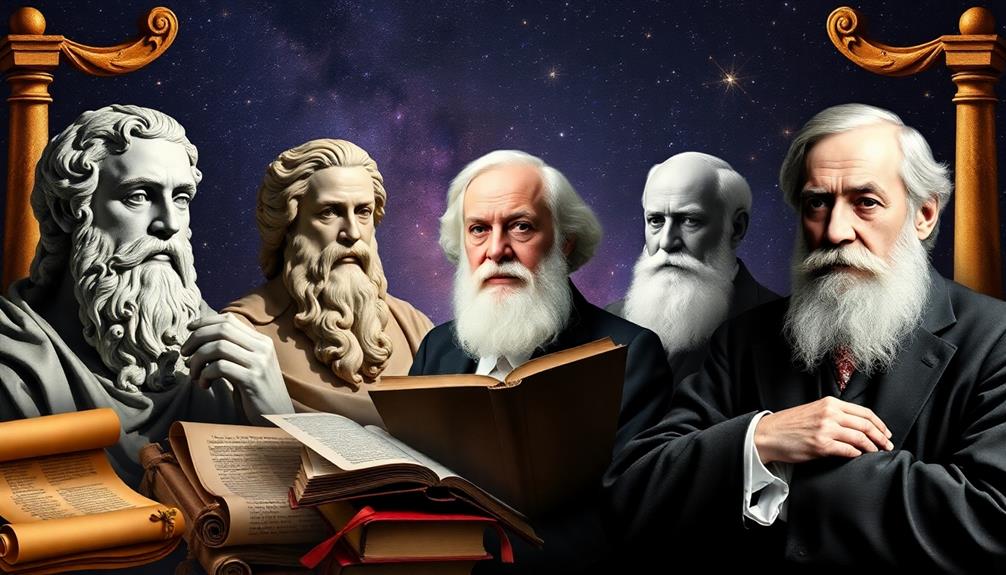When you look at the philosophers who changed Western thought, you can't ignore the early Greeks. Figures like Socrates, Plato, and Aristotle shifted focus toward ethics, reality, and knowledge through critical inquiry and logical frameworks. Their ideas shaped perspectives on morality and the nature of existence. Later thinkers like Kant and Descartes further challenged traditional views, encouraging modern philosophical exploration. Each contributed richly to the conversations that still influence us today. There's much more to uncover about how these great minds reshaped our world and continue to impact our lives.
Key Takeaways
- Early Greek philosophers like Thales and Socrates shifted focus towards rational inquiry and ethical questioning, laying the groundwork for Western philosophy.
- Plato's Theory of Forms and vision of philosopher-kings influenced moral absolutism and political thought, shaping future philosophical discourse.
- Aristotle established syllogism and integrated empirical observation, fundamentally transforming deductive reasoning and the scientific method in Western thought.
- Hellenistic philosophies, including Stoicism and Epicureanism, emphasized personal ethics and individual happiness, impacting later moral philosophy and practical ethics.
- Modern philosophers like Descartes and Kant challenged traditional views, fostering critical inquiry and evolving epistemological frameworks in response to scientific advancements.
Early Greek Philosophers

The early Greek philosophers laid the groundwork for Western thought, transforming how people understood the world around them. Thales of Miletus, recognized as the first Greek philosopher, shifted the focus from mythology to rational inquiry around 624 BCE. He argued that water is the fundamental substance of the cosmos, marking an early form of scientific thought.
Following him, Pythagoras, active around 570 BCE, emphasized the significance of numbers, introducing deductive reasoning that influenced how you approach knowledge.
Another key figure, Protagoras, born in 490 BCE, challenged conventional views with his assertion that "man is the measure of all things." This highlighted the subjective nature of truth and knowledge, prompting you to question established norms.
Finally, Socrates, often called the father of Western philosophy, developed the Socratic Method. This technique of ethical inquiry and critical questioning encourages self-awareness and virtue, making you examine your beliefs deeply.
These early philosophers laid a rich foundation, encouraging a shift toward rational thought and inquiry that continues to shape your understanding of the world today.
Pioneers of Mathematics

When you think about the origins of mathematics, you can't overlook the influence of early pioneers like Pythagoras and Euclid.
They didn't just explore numbers; they transformed how you understand the cosmos through mathematical relationships and deductive reasoning.
Their ideas laid the groundwork for the mathematical frameworks that continue to shape your world today.
Mathematical Cosmos Explained
Numbers have always held a mysterious power, shaping our understanding of the universe. Pythagoras, the father of Pythagoreanism, believed that numbers and their relationships were key to comprehending the cosmos. His ideas influenced not only mathematics but also music theory.
Later, Euclid, often called the "Father of Geometry," compiled the *Elements*, providing a systematic framework for geometric principles. His work laid the groundwork for future mathematical concepts, enabling you to explore shapes and their properties.
Archimedes further advanced geometry, calculating the area of a circle and establishing principles of levers and buoyancy. The introduction of zero by Indian mathematicians transformed Western mathematics, paving the way for algebra.
Finally, the Renaissance brought Fibonacci's sequence into the spotlight, revealing patterns in nature and art.
Here's a quick recap of these pioneers:
- Pythagoreanism: Emphasized numerical relationships in the universe.
- Euclid's Elements: Established foundational geometric principles.
- Fibonacci Sequence: Connected mathematics to nature and aesthetics.
These contributions illustrate how mathematical concepts have enriched our understanding of the universe, revealing the intricate patterns that govern all things.
Deductive Reasoning Revolution
Deductive reasoning marked a revolutionary shift in how people approached mathematics and philosophy, transforming abstract concepts into clear logical frameworks.
Pythagoras, who lived from 570 to 495 BCE, laid the groundwork by proposing that numbers are the essence of reality. His Pythagorean theorem exemplifies deductive reasoning, illustrating the relationship between the sides of a right triangle (a² + b² = c²). This logical structure allowed for the derivation of fundamental truths in mathematics.
Later, Aristotle (384-322 BCE) expanded upon this foundation, establishing the syllogism as a key component of deductive reasoning. His work helped to formalize logical conclusions drawn from general principles, markedly influencing Western thought.
Aristotle's method provided a systematic approach that not only advanced mathematics but also shaped the development of logic as a formal discipline.
Together, Pythagoras and Aristotle transformed the landscape of philosophical inquiry, enabling thinkers to reason clearly and systematically. Their contributions remain essential not just in mathematics but across various fields, marking a pivotal moment in the evolution of human thought.
Deductive reasoning continues to be an important tool for anyone seeking to understand complex ideas logically.
Foundations of Ethics

Exploring the foundations of ethics reveals a rich tapestry of philosophical thought that has shaped our understanding of morality. Key figures like Socrates, Plato, and Aristotle laid the groundwork for ethical reasoning, each contributing uniquely to the discourse.
- Socrates emphasized the importance of virtue and knowledge, using the Socratic Method to challenge others to critically examine their moral beliefs.
- Plato, a student of Socrates, introduced the Theory of Forms, positing that ideal forms of justice and goodness exist beyond our physical domain, which influenced moral absolutism.
- Aristotle expanded this by presenting virtue ethics, suggesting that moral virtue is a balance between excess and deficiency, with the ultimate goal being eudaimonia, or human flourishing.
In contrast, thinkers like Protagoras introduced relativism, declaring that "man is the measure of all things," which challenged absolute truths in ethics.
Meanwhile, Epicurus advocated for pleasure as the highest good, stressing tranquility and friendship as essential for a fulfilled life.
Idealism and Political Thought

When you consider idealism in political thought, Plato's Theory of Forms stands out as a cornerstone, highlighting the distinction between the ideal and the material domain.
You'll find that this philosophical framework leads to his vision of a just society ruled by philosopher-kings.
Kant's moral philosophy further enriches this discussion, as his Categorical Imperative shapes our understanding of universal moral laws in politics.
Plato's Theory of Forms
At the heart of Plato's philosophy lies his Theory of Forms, which underscores the distinction between the imperfect physical world and the sphere of perfect ideals. This theory emphasizes that true knowledge comes from understanding these ideal forms, such as Justice, Beauty, and Goodness, rather than relying solely on sensory experiences.
In "The Republic," Plato illustrates this concept through the Allegory of the Cave, where prisoners mistake shadows for reality, symbolizing the journey from ignorance to enlightenment.
His framework profoundly influences Western political thought by suggesting that:
- Ideal forms exist independently of the physical sphere.
- Knowledge of these forms is essential for attaining true understanding.
- Philosophers, as seekers of truth, should govern society.
Kant's Moral Philosophy
How can we navigate the complexities of moral decision-making in a way that respects everyone's autonomy? Immanuel Kant's moral philosophy provides a compelling framework. Central to his thought is the Categorical Imperative, which asserts that your moral actions should be universally applicable, emphasizing the inherent worth of all rational beings.
Kant believed that true moral worth arises from acting out of duty and adherence to ethical principles, rather than being swayed by personal inclinations or consequences. In his "Groundwork for the Metaphysics of Morals," he urges you to treat humanity as an end in itself, not merely as a means to an end.
This respect for human nature and autonomy forms the backbone of his approach, guiding you toward decisions that uphold the dignity of others. Kant's political thought further reinforces these ideals, advocating for a republican government grounded in the rule of law and respect for individual freedoms.
His influence stretches through Western thought, shaping German Idealism and contemporary ethics, as he seamlessly integrates reason with moral philosophy. By embracing Kant's insights, you can navigate moral dilemmas with a deeper understanding of justice and respect for autonomy.
Philosophers of Happiness

Happiness has captivated thinkers throughout history, leading to diverse philosophies that explore its nature and attainment. Among these philosophers, Epicurus and Socrates stand out for their insights into happiness and virtue.
Epicurus argued that true happiness is achieved through tranquility (ataraxia) and the pursuit of pleasure, which he defined as mental peace rather than indulgence. He emphasized the importance of friendship and simple living, critiquing misconceptions of hedonism. He even challenged the fear of death, asserting that it shouldn't concern us since it's merely the end of sensation.
On the other hand, Socrates believed that knowledge is the ultimate good and that understanding yourself is key to achieving happiness. He taught that self-awareness and the pursuit of virtue lead to a fulfilled life.
Consider these essential aspects of happiness:
- Mental Peace: Prioritize tranquility over physical indulgence.
- Self-Knowledge: Understand your desires to live virtuously.
- Community: Value friendships as a source of joy and support.
The Cynic Approach

The Cynic approach challenges you to embrace simplicity and self-sufficiency while questioning societal norms.
By rejecting materialism, you can discover a more authentic way of living that prioritizes virtue over superficial status.
This philosophy invites you to reflect on what truly brings happiness and fulfillment in your life.
Simplicity and Self-Sufficiency
Simplicity and self-sufficiency lie at the heart of the Cynic approach, challenging you to rethink conventional values.
Diogenes of Sinope epitomized this philosophy, living a life of extreme asceticism and often critiquing materialism. By rejecting societal norms, he demonstrated that true happiness stems from virtue rather than wealth or status.
To embrace the Cynic mindset, consider these key principles:
- Live in Accordance with Nature: Prioritize your natural needs over societal expectations.
- Reject Materialism: Understand that possessions don't define your moral character or happiness.
- Cultivate Self-Sufficiency: Find contentment within yourself rather than through external validation.
Critique of Social Norms
In rejecting social norms, the Cynics invite you to question the very foundations of societal expectations. By advocating for a life of simplicity and virtue, they encourage you to examine what truly matters. Diogenes of Sinope, the most famous Cynic, lived in a barrel to illustrate that material possessions don't equate to happiness. Instead, he emphasized authenticity and self-sufficiency, challenging you to live according to nature rather than conforming to artificial societal pressures.
| Cynics' Beliefs | Traditional Views | Impact on Society |
|---|---|---|
| Embrace simplicity | Pursue materialism | Encourage self-reflection |
| Value authenticity | Promote conformity | Inspire philosophical movements |
| Live in accordance with nature | Follow social norms | Question accepted values |
The Cynics' sharp critiques of hypocrisy, like Diogenes walking with a lantern in daylight to find an honest man, serve as a powerful reminder. They invite you to reject superficiality and embrace a life grounded in true virtue. By doing so, you can lead a more meaningful existence, free from the constraints of societal expectations.
Stoicism's Enduring Legacy

Five centuries after its inception, Stoicism continues to shape our understanding of resilience and virtue. Founded by Zeno of Citium, Stoicism emphasizes that true virtue lies in how we respond to life's challenges. Its teachings, popularized by figures like Seneca and Marcus Aurelius, are deeply woven into the fabric of Western moral philosophy and personal development.
Here are three key aspects of Stoicism's enduring legacy:
- Emotional Resilience: Stoicism teaches you to cultivate emotional resilience (apatheia), enabling you to maintain inner peace amidst turmoil.
- Acceptance of Fate: The principle of amor fati encourages you to embrace life's challenges rather than resist them, fostering a proactive mindset.
- Ethical Living: By prioritizing virtue over external circumstances, Stoicism guides you toward ethical decisions that enhance your character and well-being.
In today's complex world, Stoicism is experiencing a revival, influencing modern self-help and psychological practices like cognitive behavioral therapy (CBT).
As you explore these principles, you'll find valuable tools for maneuvering stress and achieving personal growth.
The Role of Reason

Reason has always played a pivotal role in shaping Western philosophy, guiding thinkers through complex questions about existence, morality, and knowledge. You see, philosophers like Plato and Aristotle utilized reason to explore these themes, albeit in distinct ways. Plato viewed reason as a vehicle to access Perfect Forms, while Aristotle prioritized empirical observation and logical analysis.
In Aristotle's framework, he introduced syllogism, a form of deductive reasoning that laid the groundwork for modern logic. Additionally, the Socratic Method, with its emphasis on critical questioning, illustrated how reason can stimulate thought and lead to self-awareness.
The Enlightenment era marked a significant elevation of reason's role, with thinkers like Immanuel Kant applying it to morality and human experience. This period birthed key philosophical movements, namely rationalism and empiricism, which you can see in the table below:
| Rationalism | Empiricism |
|---|---|
| Advocates innate knowledge | Emphasizes sensory experience |
| Utilizes deductive reasoning | Focuses on empirical observation |
| Key figures: Descartes, Kant | Key figures: Locke, Hume |
| Knowledge through reason | Knowledge through experience |
Through these developments, reason has remained a cornerstone of knowledge in Western thought.
Influence of Socratic Thought

While many philosophies emphasize abstract theories, Socratic thought prioritizes the importance of critical questioning and dialogue. The Socratic Method encourages you to engage deeply with ethical concepts, fostering self-reflection and a pursuit of virtue. Socrates famously declared that "the unexamined life isn't worth living," highlighting how essential it's to question your beliefs and values.
Here are three key influences of Socratic thought on Western moral philosophy:
- Critical Inquiry: The Socratic Method promotes continuous questioning, pushing you to scrutinize your assumptions and understand the essence of ethics.
- Focus on Virtue: Socrates emphasized that knowledge and virtue are intertwined, suggesting that true wisdom leads to moral behavior.
- Legacy of Dialogue: Through Plato's dialogues, Socratic ideas have permeated philosophical discourse, shaping how you think about ethics today.
Socrates' execution in 399 BCE illustrates the challenges faced by those who challenge societal norms. His teachings, which advocate for self-examination and moral integrity, continue to resonate, urging you to reflect on your own beliefs and actions in the pursuit of a just life.
Development of Western Philosophy

Building on the foundation laid by Socratic thought, Western philosophy evolved through a series of transformative ideas and figures. Early Greek philosophers like Thales shifted the focus from myth to rational inquiry, proposing water as the fundamental element of the cosmos.
During the Classical period, Socrates emphasized ethical questioning, while Plato introduced the Theory of Forms, distinguishing between the ideal and material worlds.
Aristotelian philosophy emerged in the 4th century BCE, establishing a thorough system of knowledge that incorporated empirical observation and deductive reasoning. This laid the groundwork for modern scientific methods, shaping how you understand the human experience.
As you explore Hellenistic philosophies like Stoicism and Epicureanism, you'll find their focus on personal ethics and happiness greatly influenced Roman thought and later Western moral philosophy.
The shift to modern philosophy in the early modern period marked another change, as thinkers like Descartes and Kant challenged previous metaphysical assumptions. This led to new epistemological frameworks that separated philosophy from traditional authorities, inviting you to question the very nature of knowledge and existence.
This dynamic evolution continues to shape philosophical discourse today.
Frequently Asked Questions
Who Is the Most Influential Philosopher in Western Philosophy?
Determining the most influential philosopher in Western philosophy isn't easy. You might consider Socrates for his critical questioning or Kant for his ideas on morality. Each philosopher offers unique insights that continue to shape contemporary thought.
Who Were the 3 Greek Philosophers Responsible for Much of Western Philosophy?
Imagine debating ethics with friends. You'd find Socrates, Plato, and Aristotle shaping your discussions. Socrates' questioning, Plato's ideal forms, and Aristotle's empirical approach are the foundational pillars of Western philosophy you engage with daily.
Who Are the Fathers of Western Philosophy?
You'll find that Socrates, Plato, and Aristotle are often regarded as the fathers of Western philosophy. Their ideas shaped critical thinking, ethics, and logic, laying the groundwork for philosophical inquiry that influences you today.
Who Is the Most Influential Philosopher of All Time?
If philosophy's a grand tapestry, you might find Socrates' threads woven most tightly. His relentless questioning inspires you to seek truth, prompting countless thinkers to follow, shaping the very essence of Western thought you engage with today.
Conclusion
Just as a river carves its way through the landscape, shaping the earth around it, the philosophers we've explored have sculpted the very foundation of Western thought. Their ideas flow into the minds of countless generations, nourishing the roots of ethics, happiness, and reason. Like a wise old tree standing tall, their legacy continues to offer shade and shelter, inviting us to ponder our place in the world and guiding us toward the light of understanding.









